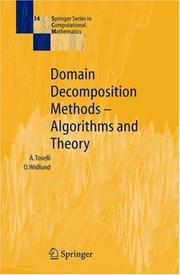| Listing 1 - 6 of 6 |
Sort by
|

ISBN: 9783540206965 9783540266624 Year: 2005 Publisher: Berlin Heidelberg Springer Berlin Heidelberg
Abstract | Keywords | Export | Availability | Bookmark
 Loading...
Loading...Choose an application
- Reference Manager
- EndNote
- RefWorks (Direct export to RefWorks)
The purpose of this text is to offer a comprehensive and self-contained pre sentation of some of the most successful and popular domain decomposition methods for partial differential equations. Strong emphasis is put on both al gorithmic and mathematical aspects. In addition, we have wished to present a number of methods that have not been treated previously in other mono graphs and surveys. We believe that this monograph will offer something new and that it will complement those of Smith, Bj0rstad, and Gropp [424] and Quarteroni and Valli [392]. Our monograph is also more extensive and broader than the surveys given in Chan and Mathew [132], Farhat and Roux [201], Le Tallec [308], the habilitation thesis by Wohlmuth [469], and the well-known SIAM Review articles by Xu [472] and Xu and Zou [476]. Domain decomposition generally refers to the splitting of a partial differen tial equation, or an approximation thereof, into coupled problems on smaller subdomains forming a partition of the original domain. This decomposition may enter at the continuous level, where different physical models may be used in different regions, or at the discretization level, where it may be con venient to employ different approximation methods in different regions, or in the solution of the algebraic systems arising from the approximation of the partial differential equation. These three aspects are very often interconnected in practice. This monograph is entirely devoted to the third aspect of domain decompo sition.
Numerical solutions of algebraic equations --- Numerical solutions of differential equations --- Computer science --- Programming --- Computer architecture. Operating systems --- informatica --- computerbesturingssystemen --- programmeren (informatica) --- wiskunde --- informaticaonderzoek --- architectuur (informatica)
Book
ISBN: 9783540344698 Year: 2007 Publisher: Berlin Heidelberg Springer Berlin Heidelberg
Abstract | Keywords | Export | Availability | Bookmark
 Loading...
Loading...Choose an application
- Reference Manager
- EndNote
- RefWorks (Direct export to RefWorks)
Domain decomposition is an active, interdisciplinary research area concerned with the development, analysis, and implementation of coupling and decoupling strategies in mathematical and computational models of natural and engineered systems. Since the advent of hierarchical distributed memory computers, it has been motivated by considerations of concurrency and locality in a wide variety of large-scale problems, continuous and discrete. Historically, it emerged from the analysis of partial differential equations, beginning with the work of Schwarz in 1870. The present volume sets forth new contributions in areas of numerical analysis, computer science, scientific and industrial applications, and software development.
Numerical analysis --- Computer science --- Computer. Automation --- informatica --- wiskunde --- algoritmen --- informaticaonderzoek --- numerieke analyse
Book

ISBN: 9783540751991 Year: 2008 Publisher: Berlin Heidelberg Springer Berlin Heidelberg
Abstract | Keywords | Export | Availability | Bookmark
 Loading...
Loading...Choose an application
- Reference Manager
- EndNote
- RefWorks (Direct export to RefWorks)
This volume contains a selection of papers presented at the 17th International Conference on Domain Decomposition Methods in Science and Engineering held at St. Wolfgang / Strobl, Austria, July 3 - 7, 2006. Domain decomposition is an active, interdisciplinary research area concerned with the development, analysis, and implementation of coupling and decoupling strategies in mathematical and computational models. Domain decomposition techniques provide efficient tools for treating problems in all Computational Sciences. The reader will become familiar with the newest domain decomposition technologies and their use for modeling and simulating of complex problems from different fields of applications.
Numerical analysis --- Computer science --- Computer. Automation --- informatica --- wiskunde --- algoritmen --- informaticaonderzoek --- numerieke analyse
Multi
ISBN: 9783540751991 Year: 2008 Publisher: Berlin, Heidelberg Springer-Verlag Berlin Heidelberg
Abstract | Keywords | Export | Availability | Bookmark
 Loading...
Loading...Choose an application
- Reference Manager
- EndNote
- RefWorks (Direct export to RefWorks)
This volume contains a selection of papers presented at the 17th International Conference on Domain Decomposition Methods in Science and Engineering held at St. Wolfgang / Strobl, Austria, July 3 - 7, 2006. Domain decomposition is an active, interdisciplinary research area concerned with the development, analysis, and implementation of coupling and decoupling strategies in mathematical and computational models. Domain decomposition techniques provide efficient tools for treating problems in all Computational Sciences. The reader will become familiar with the newest domain decomposition technologies and their use for modeling and simulating of complex problems from different fields of applications.
Numerical analysis --- Computer science --- Computer. Automation --- informatica --- wiskunde --- algoritmen --- informaticaonderzoek --- numerieke analyse
Multi

ISBN: 9783031507694 9783031507687 9783031507700 9783031507717 Year: 2024 Publisher: Cham Springer Nature, Imprint: Springer
Abstract | Keywords | Export | Availability | Bookmark
 Loading...
Loading...Choose an application
- Reference Manager
- EndNote
- RefWorks (Direct export to RefWorks)
Numerical analysis --- Mathematics --- Planning (firm) --- Computer science --- Computer. Automation --- informatica --- mathematische modellen --- wiskunde --- informaticaonderzoek --- numerieke analyse
Book

ISBN: 9783031507694 Year: 2024 Publisher: Cham Springer Nature Switzerland :Imprint: Springer
Abstract | Keywords | Export | Availability | Bookmark
 Loading...
Loading...Choose an application
- Reference Manager
- EndNote
- RefWorks (Direct export to RefWorks)
| Listing 1 - 6 of 6 |
Sort by
|

 Search
Search Feedback
Feedback About UniCat
About UniCat  Help
Help News
News